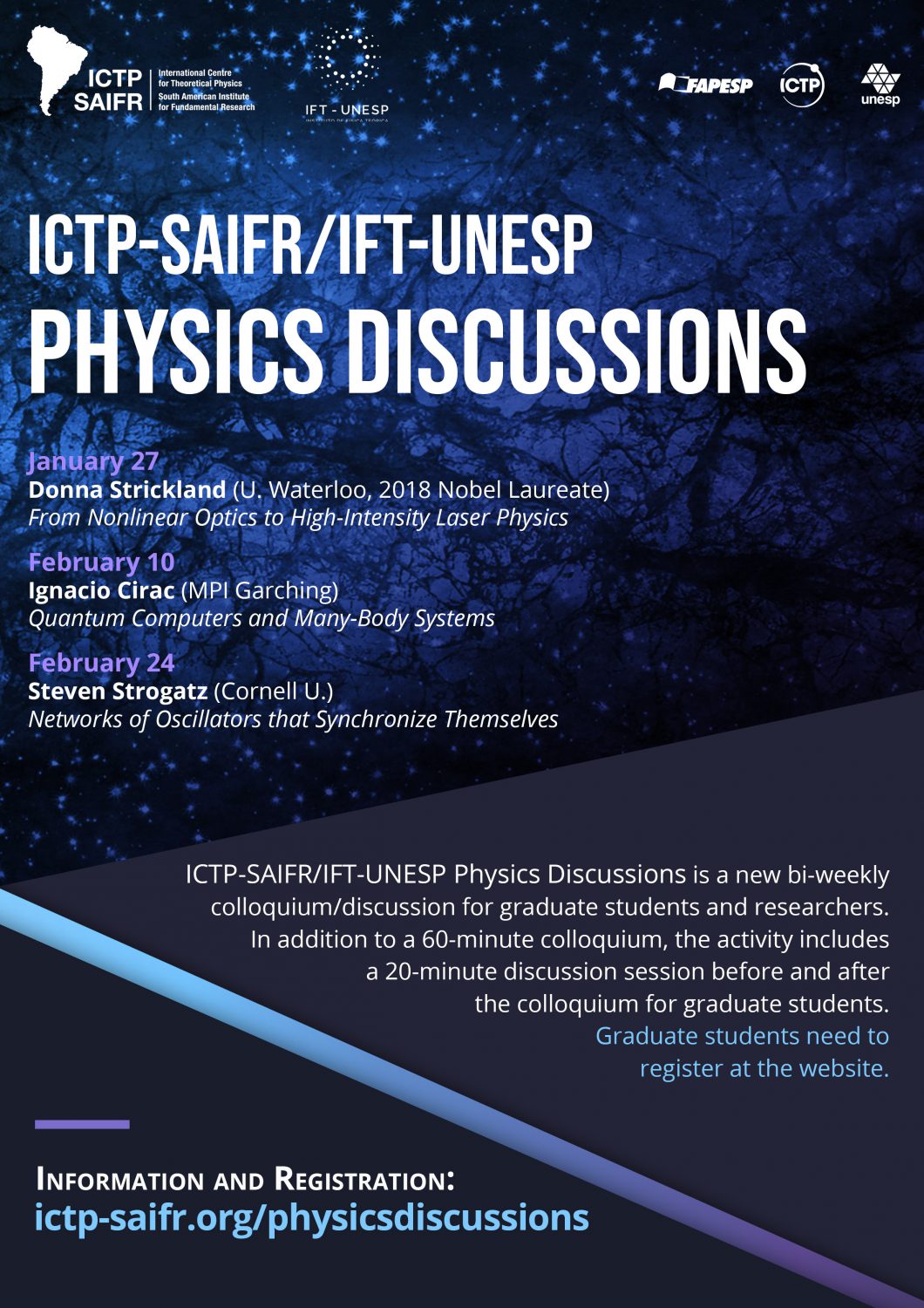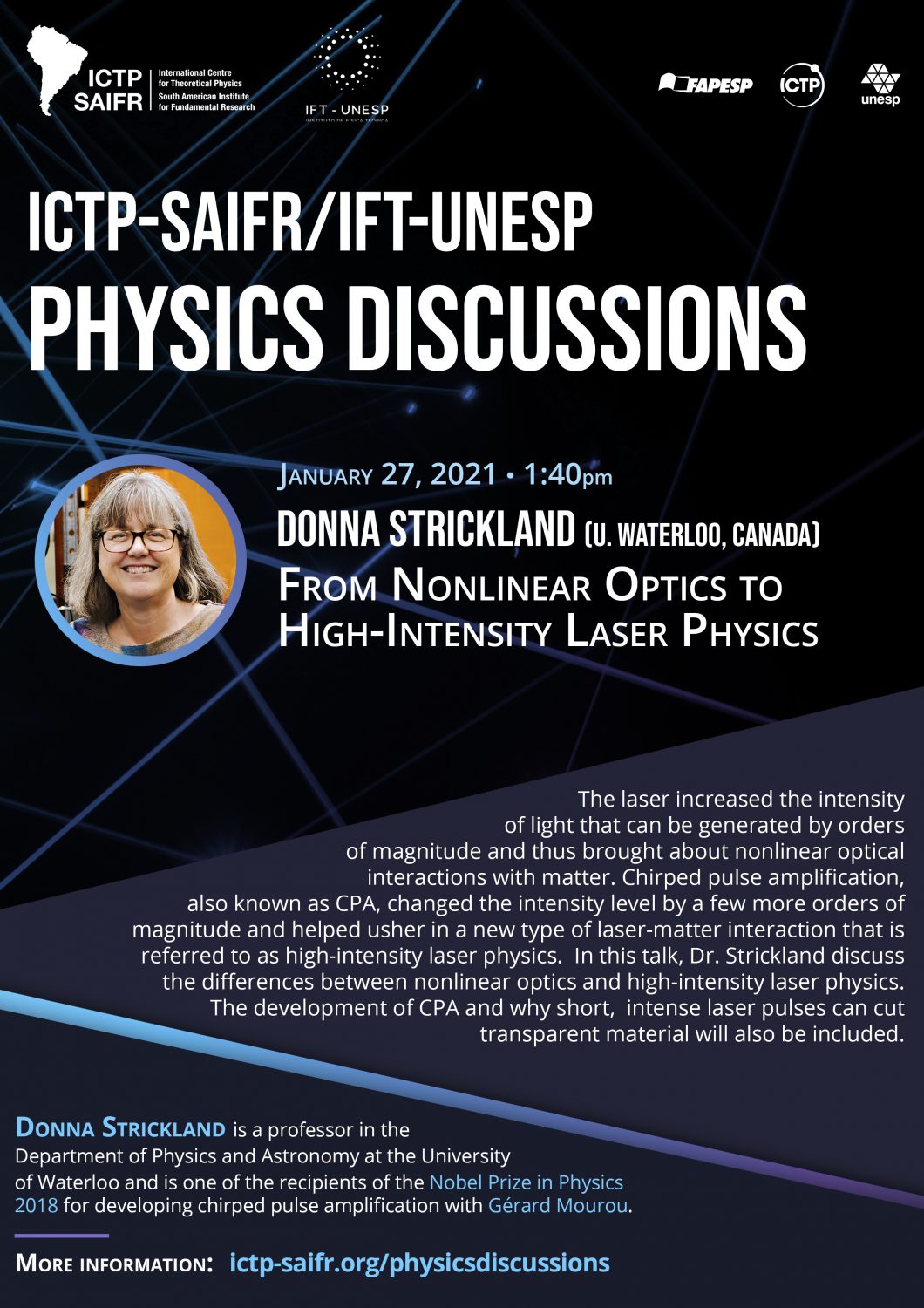(teste)Physics Discussions: Donna Strickland (U. Waterloo)
Home
The laser increased the intensity of light that can be generated by orders of magnitude and thus brought about nonlinear optical interactions with matter. Chirped pulse amplification, also known as CPA, changed the intensity level by a few more orders of magnitude and helped usher in a new type of laser-matter interaction that is referred to as high-intensity laser physics. In this talk, I will discuss the differences between nonlinear optics and high-intensity laser physics. The development of CPA and why short, intense laser pulses can cut transparent material will also be included. I will also discuss future applications.
ABOUT THE SPEAKER
Donna Strickland is a professor in the Department of Physics and Astronomy at the University of Waterloo and is one of the recipients of the Nobel Prize in Physics 2018 for developing chirped pulse amplification with Gérard Mourou, her PhD supervisor at the time. They published this Nobel-winning research in 1985 when Strickland was a PhD student at the University of Rochester in New York state. Together they paved the way toward the most intense laser pulses ever created. The research has several applications today in industry and medicine — including the cutting of a patient’s cornea in laser eye surgery, and the machining of small glass parts for use in cell phones.
Strickland was a research associate at the National Research Council Canada, a physicist at Lawrence Livermore National Laboratory and a member of technical staff at Princeton University. In 1997, she joined the University of Waterloo, where her ultrafast laser group develops high-intensity laser systems for nonlinear optics investigations.
Strickland was named a Companion of the Order of Canada. She is a recipient of a Sloan Research Fellowship, a Premier’s Research Excellence Award and a Cottrell Scholar Award. She received the Rochester Distinguished Scholar Award and the Eastman Medal from the University of Rochester. Strickland served as the president of the Optical Society (OSA) in 2013 and is a fellow of OSA, the Royal Society of Canada, and SPIE (International Society for Optics and Photonics). She is an honorary fellow of the Canadian Academy of Engineering as well as the Institute of Physics. She received the Golden Plate Award from the Academy of Achievement and holds numerous honorary doctorates.
Strickland earned a PhD in optics from the University of Rochester and a B.Eng. from McMaster University.
PROGRAM (Brasilia time, BRT)
Wednesday, January 27
Speaker: Donna Strickland (University of Waterloo, 2018 Nobel Laureate)
Title: From Nonlinear Optics to High-Intensity Laser Physics
13:40-14:00 Discussion (for graduate students)
14:00-15:00 Coloquium
15:00-15:20 Discussion (for graduate students)
The Registration form for graduate students who would like to participate via Zoom is HERE
The Youtube link for the colloquium transmitted live will be posted on this website.
About Physics Discussions
ICTP-SAIFR/IFT-UNESP Physics Discussions is a new bi-weekly colloquium/discussion for graduate students and researchers. In addition to a 60-minute colloquium for all, the activity includes a 20-minute discussion of research and career choices before the colloquium and a 20-minute discussion of physics after the colloquium just for graduate students. The colloquium will be broadcast live on Youtube, but the discussion session before and after the colloquium will use a Zoom platform restricted to graduate students which has limited space.
The Registration form for graduate students who would like to participate via Zoom is HERE
The Youtube link for the colloquium transmitted live will be posted on this website.
PROGRAM (Brasilia time, BRT)
Wednesday, January 27
Speaker: Donna Strickland (University of Waterloo, 2018 Nobel Laureate)
Title: From Nonlinear Optics to High-Intensity Laser Physics
13:40-14:00 Discussion (for graduate students)
14:00-15:00 Coloquium
15:00-15:20 Discussion (for graduate students)
Wednesday, February 10
Speaker: Ignacio Cirac (Max Planck Institute of Quantum Optics, Garching)
Title: Quantum Computers and Many-Body Systems
13:40-14:00 Discussion (for graduate students)
14:00-15:00 Coloquium
15:00-15:20 Discussion (for graduate students)
Wednesday, February 24
Speaker: Steven Strogatz (Cornell University)
Title: Networks of Oscillators that Synchronize Themselves
10:40-11:00 Discussion (for graduate students)
11:00-12:00 Coloquium
12:00-12:20 Discussion (for graduate students)


